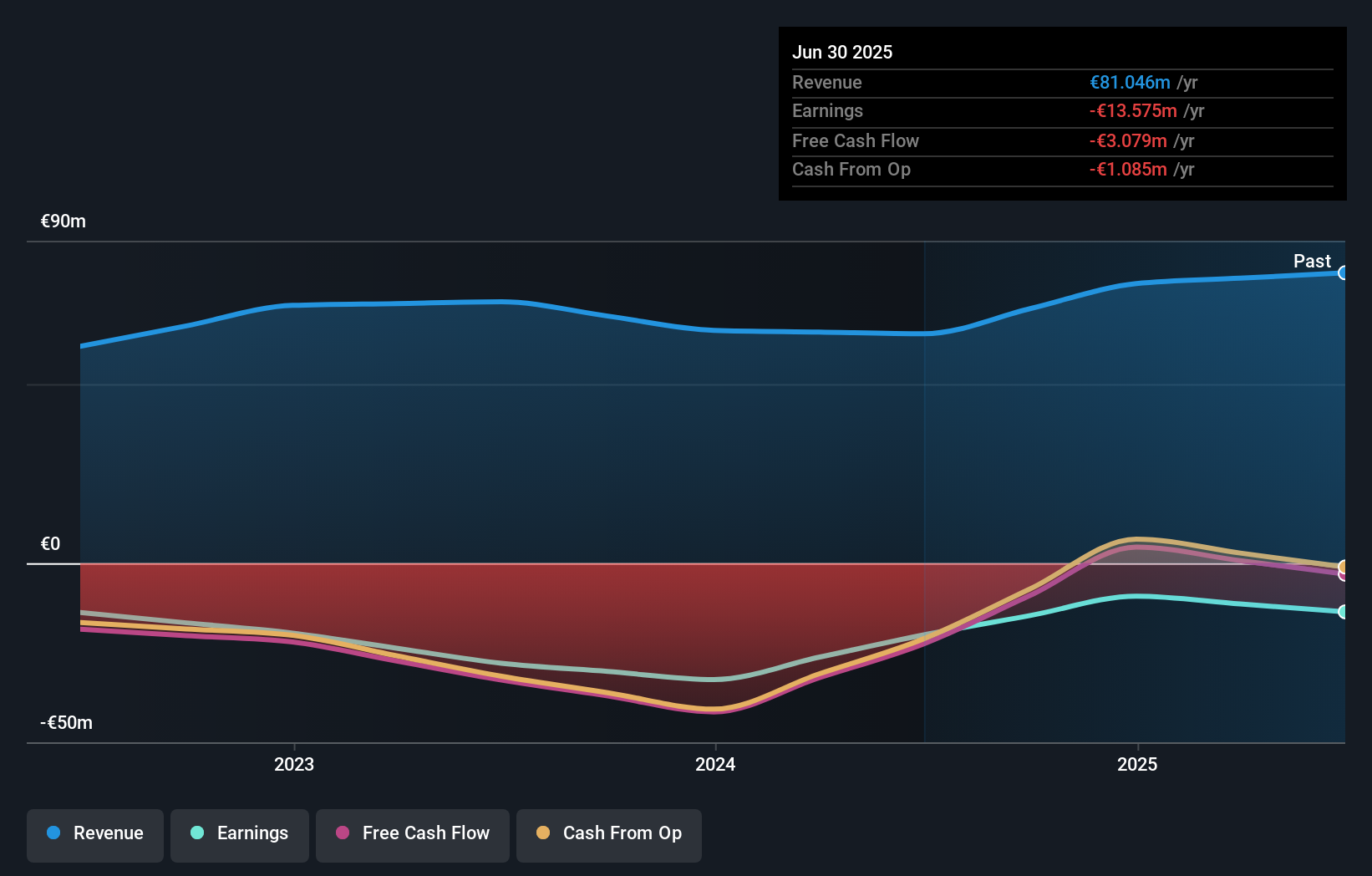- France
- /
- Communications
- /
- ENXTPA:PARRO
Following recent decline, Parrot S.A.'s (EPA:PARRO) top shareholder CEO Henri Seydoux sees holdings value drop by 12%
Key Insights
- Parrot's significant insider ownership suggests inherent interests in company's expansion
- The largest shareholder of the company is Henri Seydoux with a 62% stake
- 16% of Parrot is held by Institutions
Every investor in Parrot S.A. (EPA:PARRO) should be aware of the most powerful shareholder groups. We can see that individual insiders own the lion's share in the company with 62% ownership. Put another way, the group faces the maximum upside potential (or downside risk).
As market cap fell to €246m last week, insiders would have faced the highest losses than any other shareholder groups of the company.
Let's delve deeper into each type of owner of Parrot, beginning with the chart below.
Check out our latest analysis for Parrot

What Does The Institutional Ownership Tell Us About Parrot?
Many institutions measure their performance against an index that approximates the local market. So they usually pay more attention to companies that are included in major indices.
As you can see, institutional investors have a fair amount of stake in Parrot. This implies the analysts working for those institutions have looked at the stock and they like it. But just like anyone else, they could be wrong. If multiple institutions change their view on a stock at the same time, you could see the share price drop fast. It's therefore worth looking at Parrot's earnings history below. Of course, the future is what really matters.

Hedge funds don't have many shares in Parrot. With a 62% stake, CEO Henri Seydoux is the largest shareholder. This implies that they possess majority interests and have significant control over the company. Investors usually consider it a good sign when the company leadership has such a significant stake, as this is widely perceived to increase the chance that the management will act in the best interests of the company. With 9.8% and 5.0% of the shares outstanding respectively, Moneta Asset Management and Bpifrance Participations SA are the second and third largest shareholders.
While it makes sense to study institutional ownership data for a company, it also makes sense to study analyst sentiments to know which way the wind is blowing. As far as we can tell there isn't analyst coverage of the company, so it is probably flying under the radar.
Insider Ownership Of Parrot
While the precise definition of an insider can be subjective, almost everyone considers board members to be insiders. The company management answer to the board and the latter should represent the interests of shareholders. Notably, sometimes top-level managers are on the board themselves.
Insider ownership is positive when it signals leadership are thinking like the true owners of the company. However, high insider ownership can also give immense power to a small group within the company. This can be negative in some circumstances.
Our information suggests that insiders own more than half of Parrot S.A.. This gives them effective control of the company. That means they own €153m worth of shares in the €246m company. That's quite meaningful. It is good to see this level of investment. You can check here to see if those insiders have been buying recently.
General Public Ownership
The general public, who are usually individual investors, hold a 23% stake in Parrot. While this size of ownership may not be enough to sway a policy decision in their favour, they can still make a collective impact on company policies.
Next Steps:
While it is well worth considering the different groups that own a company, there are other factors that are even more important. Be aware that Parrot is showing 1 warning sign in our investment analysis , you should know about...
If you would prefer check out another company -- one with potentially superior financials -- then do not miss this free list of interesting companies, backed by strong financial data.
NB: Figures in this article are calculated using data from the last twelve months, which refer to the 12-month period ending on the last date of the month the financial statement is dated. This may not be consistent with full year annual report figures.
New: Manage All Your Stock Portfolios in One Place
We've created the ultimate portfolio companion for stock investors, and it's free.
• Connect an unlimited number of Portfolios and see your total in one currency
• Be alerted to new Warning Signs or Risks via email or mobile
• Track the Fair Value of your stocks
Have feedback on this article? Concerned about the content? Get in touch with us directly. Alternatively, email editorial-team (at) simplywallst.com.
This article by Simply Wall St is general in nature. We provide commentary based on historical data and analyst forecasts only using an unbiased methodology and our articles are not intended to be financial advice. It does not constitute a recommendation to buy or sell any stock, and does not take account of your objectives, or your financial situation. We aim to bring you long-term focused analysis driven by fundamental data. Note that our analysis may not factor in the latest price-sensitive company announcements or qualitative material. Simply Wall St has no position in any stocks mentioned.
About ENXTPA:PARRO
Parrot
Provides professional drones and software and services in France and internationally.
Excellent balance sheet with minimal risk.
Similar Companies
Market Insights
Community Narratives



